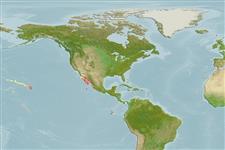Classification / Names
Common names | Synonyms | Catalog of Fishes(genus, species) | ITIS | CoL | WoRMS | Cloffa
Teleostei (teleosts) >
Ovalentaria/misc (Various families in series Ovalentaria) >
Opistognathidae (Jawfishes)
Etymology: Opistognathus: Greek, opisthe = behind + Greek, gnathos = jaw (Ref. 45335); to the very elongate upper jaw of the type species of the genus, Opistognathus nigromarginatus (Ref. 128653); walkeri: Named for of Boyd W. Walker..
Environment: milieu / climate zone / depth range / distribution range
Ecology
Marine; demersal; depth range 21 - 90 m (Ref. 75633). Tropical
Eastern Pacific: Gulf of California.
Size / Weight / Age
Maturity: Lm ? range ? - ? cm
Max length : 11.7 cm SL male/unsexed; (Ref. 75633)
Short description
Identification keys | Morphology | Morphometrics
Dorsal spines (total): 11; Dorsal soft rays (total): 12 - 13; Anal spines: 3; Anal soft rays: 11 - 12; Vertebrae: 26. This is a large (10.2-11.7 cm SL), deep-bodied species with the following set of features: adults of both sexes with long maxilla, with flexible scimitar-shaped lamina, in males, extending beyond operculum; black inner lining of maxilla and adjacent membranes; D 12 or 13; A III; 21-26 gill rakers on lower limb of first arch; 54-55 pored lateral line scales; 16 caudal vertebrae (Ref. 75633).
Juvenile specimens collected by ichthyocide at 21-24 m, and adults by trawl at 80-90 m (Ref. 75633).
Life cycle and mating behavior
Maturities | Reproduction | Spawnings | Egg(s) | Fecundities | Larvae
Bussing, W.A. and R.J. Lavenberg, 2003. Four new species of eastern tropical Pacific jawfishes (Opistognathus: Opistognathidae). Rev. Biol. Trop. 51(2):529-550. (Ref. 75633)
IUCN Red List Status (Ref. 130435)
Threat to humans
Harmless
Human uses
Tools
Special reports
Download XML
Internet sources
Estimates based on models
Phylogenetic diversity index (Ref.
82804): PD
50 = 0.5000 [Uniqueness, from 0.5 = low to 2.0 = high].
Bayesian length-weight: a=0.00389 (0.00180 - 0.00842), b=3.12 (2.94 - 3.30), in cm total length, based on all LWR estimates for this body shape (Ref.
93245).
Trophic level (Ref.
69278): 3.5 ±0.6 se; based on size and trophs of closest relatives
Fishing Vulnerability (Ref.
59153): Low vulnerability (10 of 100).
